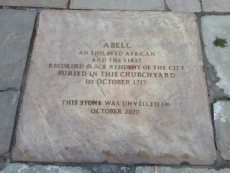 The diverse heritage of Liverpool was recognised by the installation of a memorial stone at Liverpool Parish Church on Saturday 3 October, commemorating the first recorded black resident of the City.
The diverse heritage of Liverpool was recognised by the installation of a memorial stone at Liverpool Parish Church on Saturday 3 October, commemorating the first recorded black resident of the City.
Historian Laurence Westgaph has traced the presence of a black community in Liverpool over the centuries, and the first recorded resident has been identified as Abell, an enslaved African, who was buried in the churchyard of Our Lady and St Nicholas on 1 October 1717.
A memorial stone was unveiled by Cllr Anna Rothery, the first black Lord Mayor of Liverpool, who said, “Long before the Liverpool landmarks, the famous buildings and the icons, black people were playing a role in the development of our city, a role which continues to this day.”
As well as highlighting the contribution that the black community has made to the City, the unveiling also drew attention to the societal collusion with the slave trade, which affected Liverpool Parish Church and all institutions in the 18th Century.
The Rector of Liverpool, The Revd Canon Dr Crispin Pailing, said: “We cannot hide from our past, and there is no institution from this era of our history which is free from the taint of this horrific trade.
"We cannot give justice to Abell and other enslaved Africans, but we can give them the dignity of naming them when we can, and we can give them status within the history of our city.”
Another speaker at the unveiling was Tracey Gore, who was appointed by the Mayor of Liverpool, Joe Anderson, as Chair of the city’s own Race Equality Taskforce. The council and its partners have also launched a project to ensure city streets named after affluent slavers were to be given special plaques to explain their links to the trade.
Liverpool historian Laurence Westgaph said: “This gesture by St Nicholas’ Church records in stone the presence of black people in this town for more than 300 years and at a time when Liverpool’s population was less than 10,000 people.
"Since then there has been a black presence in this great city, demonstrating that people of African descent have been resident and contributing to Liverpool life since the beginnings of the town’s rise from a struggling seaport to the second city of the British Empire and beyond.”
Memorial stone to recognise Liverpool's first black resident
First published on: 8th October 2020